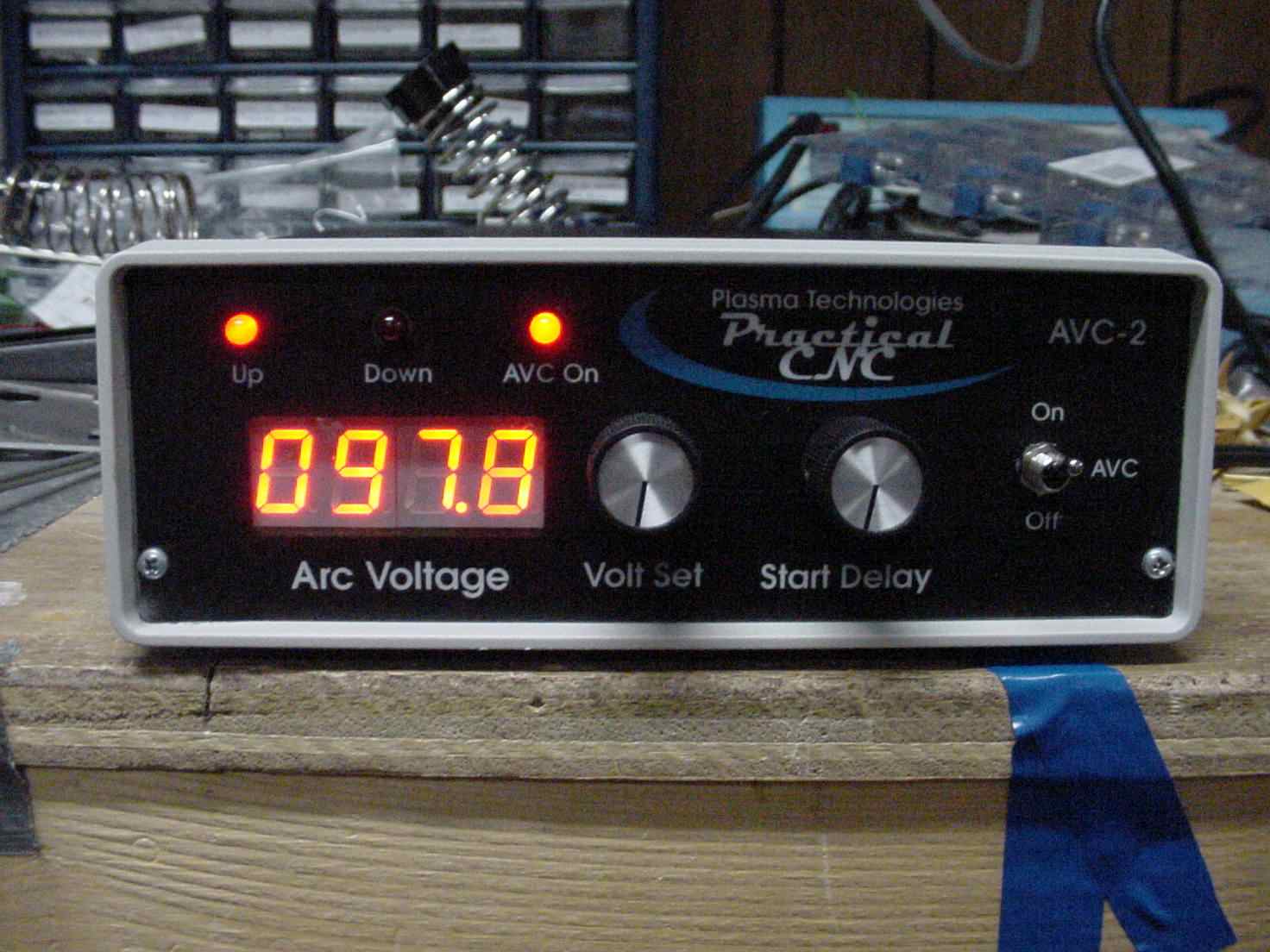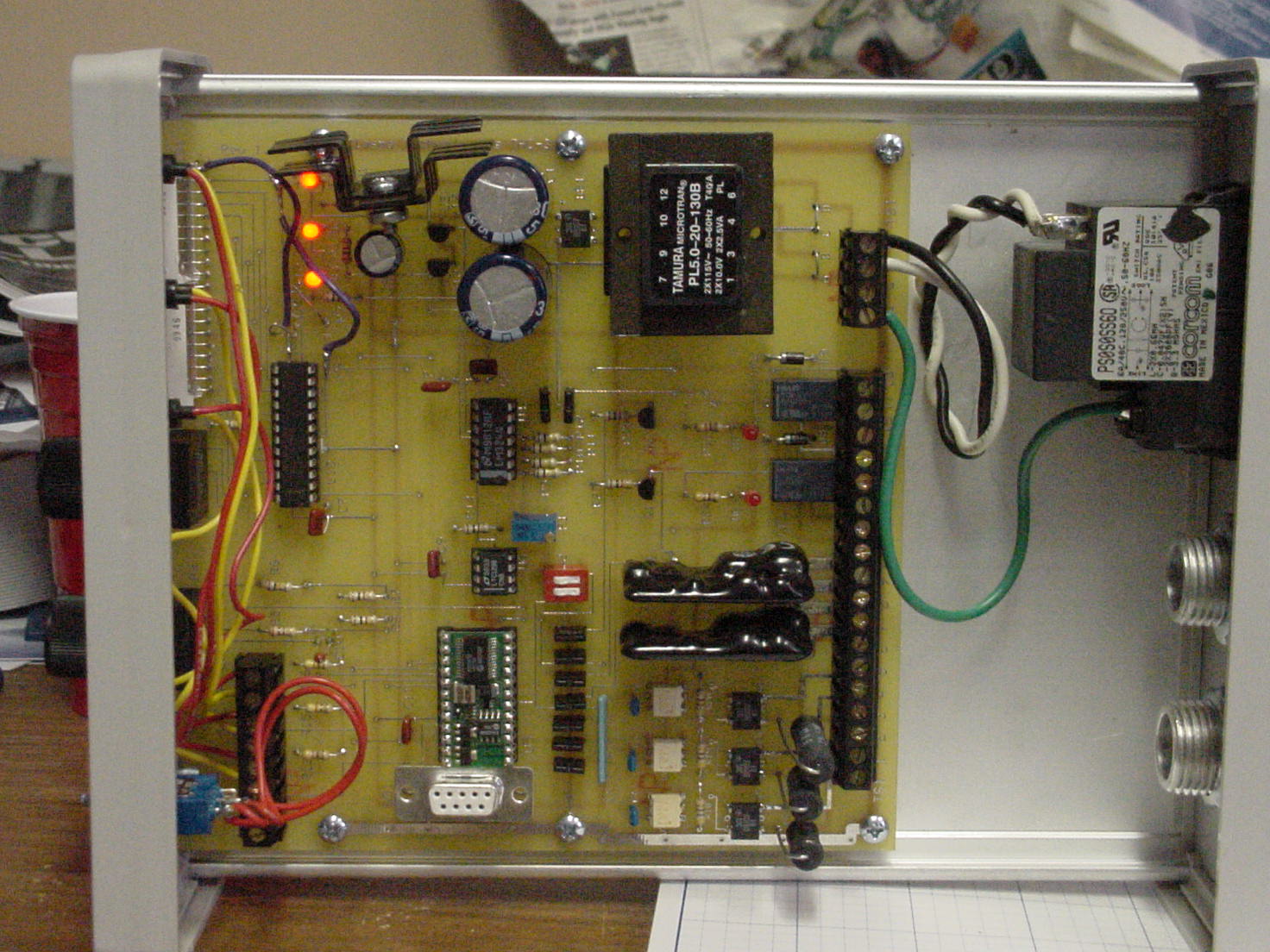Plasma Torch Height Control
I just discovered this part of the forum site.
I will post a few of my projects that I have done. They are all industrial controls that I have used in my job rebuilding Plasma Cutting Machines.
This one is used to control the cutting height of a Plasma Torch. The height of the torch above the metal being cut,·is critical for a good cut edge. The voltage at the torch is proportional to the height. The power supply output is a constant current, so as the height goes up, the length of the arc increases, and the voltage must also go up to maintain the constant current.
The Torch Height Controller measures the voltage, compares it to the set voltage, and raises or lowers the torch to maintain the proper voltage(height). The torch is mounted on a motorized lifter and the the controller turns on the up or down windings of the AC induction motor.
The input voltage is is up to 400 volts DC, and the controlled range is 70 to 240 volts DC. I use a filtered 100:1 voltage divder and a 12 bit A/D converter.
I will post the schematic as soon as I figure·out how to get a printable drawing from OrCad. I cannot post the code as this was built for a customer, and he has lots of competition. There are about 100 of these operating out in the field.
Let me know if you have any questions.
Alan Bradford
Plasma Technologies
www.plasmatechnologies.com
I will post a few of my projects that I have done. They are all industrial controls that I have used in my job rebuilding Plasma Cutting Machines.
This one is used to control the cutting height of a Plasma Torch. The height of the torch above the metal being cut,·is critical for a good cut edge. The voltage at the torch is proportional to the height. The power supply output is a constant current, so as the height goes up, the length of the arc increases, and the voltage must also go up to maintain the constant current.
The Torch Height Controller measures the voltage, compares it to the set voltage, and raises or lowers the torch to maintain the proper voltage(height). The torch is mounted on a motorized lifter and the the controller turns on the up or down windings of the AC induction motor.
The input voltage is is up to 400 volts DC, and the controlled range is 70 to 240 volts DC. I use a filtered 100:1 voltage divder and a 12 bit A/D converter.
I will post the schematic as soon as I figure·out how to get a printable drawing from OrCad. I cannot post the code as this was built for a customer, and he has lots of competition. There are about 100 of these operating out in the field.
Let me know if you have any questions.
Alan Bradford
Plasma Technologies
www.plasmatechnologies.com




Comments
Your supply uses almost the exact same set of same parts that I've used for analog supplies.
Ever put that Microtran tranformer in backwords?· I've had some of my guys do that. Blows the power fuse really fast!·
-Dan
·
I have only done that once, but caught it before powering it up. It is a pain to remove the transformer though. I put RTV on the base before soldering them in.
I did get the Raw 400 VDC wired backwards on the voltage divider once, and it brought new meaning to the term·'Smoke Generator'
Amazingly the Stamp survived, but the Display and regulator IC's were blown clean off the board.
I also just noticed the PC board is is the Beta board. I will hunt down the producion board picture. It is silk screened and I use a switching regulator to cut down on heat.
Thanks,
Alan Bradford
Plasma Technologies
where did you get a custom enclosure (specifically the face plate). or did you retrofit an existing controller
▔▔▔▔▔▔▔▔▔▔▔▔▔▔▔▔▔▔▔▔▔▔▔▔
engineer, fireman, bowler, father, WoW addict [noparse];)[/noparse]
The custom faceplate is actually a decal. My customer had 1000 made up. They are a 2 layer as there is a window ovewr the Led display and the Led's.
I have tried contacting him,·but he is out of the country and no one else there will give me the info. I will try to contact him next week when he returns.
The enclosures are from·Lansing Instrument· (www.lansing-enclosures.com)
They are a neat AL Extrusion and relitively cheap.
Thanks,
Alan Bradford
Plasma Technologies
www.plasmatechnologies.com
Found this old thread and wondered If that is a max1270 ADC chip you are using?
I have been having quite a problem with noise with mine, and thought perhaps you have an idea to address it since I would think a plasma cutter must create a bunch of noise.I am using the stamp PLC. Do you filter it with electronics or through code? I looked for the schematic post But didnt find it. I am building a coil tester for heating elements and need a more stable numbers than what I am getting. How do you handle the code from the chip?
Thanks
Gene
The A/D is A LTC 1293 I think.
It is an SPI interface
I will check when I get back to the office on Monday.
I filter everything. AC input, I/O lines, and A/D Voltage Input.
The voltage Divider I use is mounted externally in the Plasma Power Suply beeing monitored.
That is also filtered.
I use a twisted pair and shielded cable to bring the sensed voltage to the THC· (Torch Height Control).
Thay way any high voltage stays in the Plasma unit and not in the stamp control.
I am not a rocket scientist, and the code is simple. I need to update the Torch position every 1/2 to 3/4 second or so.
I take 100 readings from the ADC and average them out.
If they are within a given Dead Band I do nothing, and if outside the range I then adjust the Torch Height accordingly.
Are you reading resistance? What is the Test Voltage?
Are you getting an inductive kick when turning off the voltage?
Is the Stamp Resetting?
I have this problem if I leave the Programming Cable connected.
The Plasma Noise finds the Antenna made by the programming Cable and resets the Stamp.
I put a .1uf (or maybe .01uf) from pin 3 to ground. This helps.
Good Luck and let me know how you make out.
Alan Bradford
Plasma Technologies
www.plasmatechnologies.com
PS Sorry if there is any mistakes in spelling. I am adicted to my Spell Checker
It took a bit longer to get to the office than planned.
The ADC is a Linear Technologies LTC-1298. 2 Chanel ADC with SPI serial interface.
The voltage divider is a 100:1 Ratio.
Thew Maximum input voltage is 500 VDC
I have attached· a print of the Processor Board and the Remote Voltage Divider
I connect them with a twisted pair foil shielded cable (Belden 9501).
The seperation can be up to 100 feet.
The component that looks like a coil with the center grounded is actually a MURATA Suppression Filter.
MURATA Part # DSS6NC52A471Q55B
Mouser Electronics Vendor # 81-DSS306Y5S471M100
I put Them on all·off board Inputs and Outputs.
I also optically isolate the Inputs and use relays on the switched outputs.
The power supply is also regulated on board. I use a step down transformer for Isolation and local regulation.
Sharing DC Power Supplies causes too many problems.
I Hope this helps.
Alan Bradford
Plasma Technologies
You said that you will post the schematic. will you??. Itt will be a boon for people on this forum
regards...manjeet
Sorry It looks like I loaded the Voltage Divider print·twice.
I am on a job site in California and wont be back until Early May
I will post it then.
Sorry for the delay
Alan Bradford
·
bye....Manjeet
Are you looking to build one for yourself or to build and sell?
If it is for you, what type of lifter motor are you using, and what type of Plasma?
▔▔▔▔▔▔▔▔▔▔▔▔▔▔▔▔▔▔▔▔▔▔▔▔
Alan Bradford ·N1YMQ
Plasma Technologies
Canaan NH 03741
www.plasmatechnologies.com
Thank you.
▔▔▔▔▔▔▔▔▔▔▔▔▔▔▔▔▔▔▔▔▔▔▔▔
Why didn't I think of THAT!!!!
I can help you if it is a hobby project.· Dont want to give my engineering away to the competition.
I travel a lot and will not be back to the office until Thursday or Friday.
Post a reply Thuesday to remind me to send a copy of the schematic and code.
It is a simple circuit.
Thanks,
▔▔▔▔▔▔▔▔▔▔▔▔▔▔▔▔▔▔▔▔▔▔▔▔
Alan Bradford ·N1YMQ
Plasma Technologies
Canaan NH 03741
www.plasmatechnologies.com
Just a reminder to send the copy of the schematic and code,
and I can understand not wanting to give away your engineering, after all it is your bread and butter.
Just so that you have and idea, to buy a THC in Africa will cost you around US$ 700.00 (in our money that is equal to N$ 4500.00). To have one shipped in from overseas is just as expensive, that is the price we pay for tranquility and nature all around us... But I digress, your help will be invaluable to us on the budget end of things...
Thanking you in advance,
Wynand.
▔▔▔▔▔▔▔▔▔▔▔▔▔▔▔▔▔▔▔▔▔▔▔▔
Why didn't I think of THAT!!!!
It has been a ough year so far.
I just got home,·from the hospital, after another operation.
I am sick of being sick.
So here it is:
It is designed to give UP and Down SSR closures to move an AC induction motor that is powering your lift.
(No rocket science here)
You could change it to Opto Isolators and drive a stepper with Pulse and Direction.
I do not have the cose on my home computer and will send that tomorrow.
Gotta go· Easter company has arrived.
Good Luck
▔▔▔▔▔▔▔▔▔▔▔▔▔▔▔▔▔▔▔▔▔▔▔▔
Alan Bradford ·N1YMQ
Plasma Technologies
Canaan NH 03741
www.plasmatechnologies.com
Thank you so very much, I do hope that you will be better... my thoughts go out to you and your family...
I will go through and see what I see.
Thank you again and God bless!
Wynand.
▔▔▔▔▔▔▔▔▔▔▔▔▔▔▔▔▔▔▔▔▔▔▔▔
Why didn't I think of THAT!!!!
This setup just sent an up or down signal to a stepper driver lifter motor.
There are no gains to set, just up or down until the target voltage matches the cut voltage.
Good Luck
▔▔▔▔▔▔▔▔▔▔▔▔▔▔▔▔▔▔▔▔▔▔▔▔
Alan Bradford ·N1YMQ
Plasma Technologies
Canaan NH 03741
www.plasmatechnologies.com
I respect your privacy and won't ask about code or hardware but in your opinion is the Basic Stamp with an ADC suitable for this type of work? I've been thinking of using the Propeller and ADC, PIC32, or GHI's NETMF based chips.
thanks for the great info, i was wondering how do you control or set the initial hight of the torch?
thanks